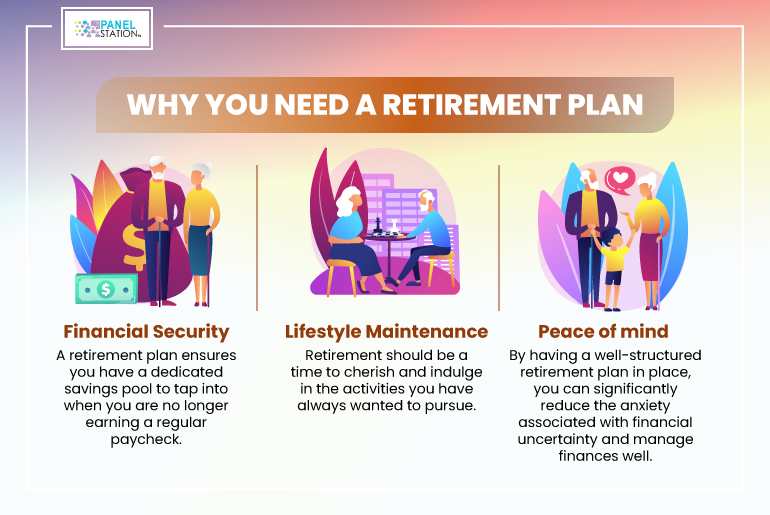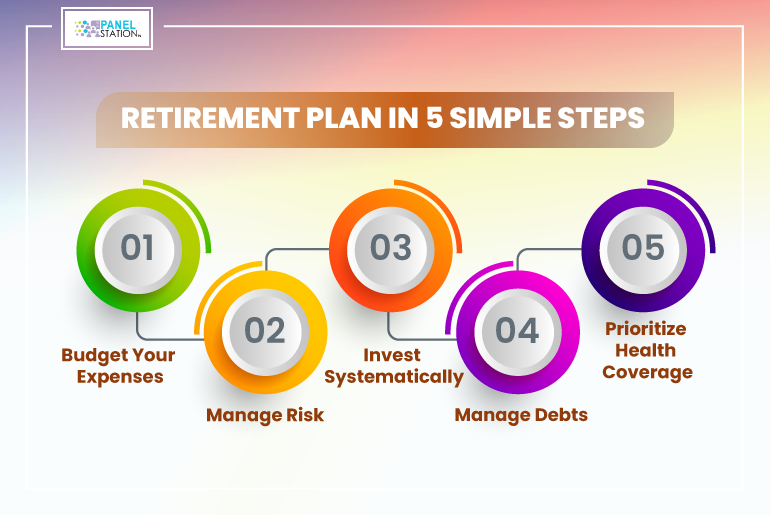Expert Tips to Help You Skillfully Manage Finances in Retirement
The golden years after retirement is a time to kick back, relax and truly enjoy the pleasure of life. However, with retirement comes the responsibility to effectively manage finances and with that financial planning for a comfortable retirement. In this blog, we’re going to dig deep into the significance of financial planning and how to manage your finances and some tips to generate income in a fun way. So, without further ado, let’s get going with ensuring a retirement that’s free from worry and will allow you to fully embrace the joys of life’s sunset years.
Why You Need a Retirement Plan
Retirement may seem distant when you’re in the prime of your career, but preparing for it should never be underestimated. Planning for your retirement is not just a financial strategy; it’s a roadmap to ensure your future well-being and peace of mind. Here are three crucial reasons why having a retirement plan is essential:
1. Financial Security
Imagine your retirement years as a long, peaceful vacation after decades of hard work. To make the most of this period, you will need a financial cushion. A retirement plan ensures you have a dedicated savings pool to tap into when you are no longer earning a regular paycheck. This financial security allows you to cover important expenses, maintain your standard of living and enjoy those long-awaited dreams like travel, hobbies or spending quality time with loved ones.
2. Lifestyle Maintenance
Retirement should be a time to cherish and indulge in the activities you have always wanted to pursue. Whether it is traveling, pursuing a new hobby or simply having more leisure time, a retirement plan helps you maintain your desired lifestyle. By setting clear financial goals and consistently saving and investing, you can ensure that you have the means to enjoy your retirement years to the fullest without worrying about money.
3. Peace of Mind
Financial stress can be a significant burden, especially during your retirement years. By having a well-structured retirement plan in place, you can significantly reduce the anxiety associated with financial uncertainty and manage finances well. Knowing that you have taken proactive steps to secure your future offers peace of mind. This emotional well-being allows you to focus on the things that truly matter, like spending quality time with family and friends, pursuing your passions, and relishing the freedom retirement brings.
Creating Your Retirement Plan in 5 Simple Steps
Planning for your retirement is a crucial process that requires careful consideration and preparation. Here are five steps to help you create a solid retirement plan:
1. Budget Your Expenses
Begin by meticulously planning your retirement expenses, which can range from everyday costs like rent to significant investments like purchasing a dream home or embarking on a world tour. Categorize your expenses into two groups: regular, day-to-day expenses and unexpected emergencies that life may throw your way. For everyday expenses, explore monthly investment schemes and take advantage of government and bank programs designed for senior citizens. For unexpected emergencies, focus on long-term financial stability through strategic investments. Building a strong financial foundation ensures that unforeseen costs won’t derail your retirement plans.
2. Manage Risk
Life is filled with unpredictable events, both physical and emotional, as well as concerns related to property and belongings. To protect yourself and your loved ones, consider comprehensive insurance coverage as an integral part of your retirement plan.
3. Invest Systematically
Investing is the cornerstone of financial security in retirement. However, it should be a well-thought-out, systematic process. Prioritize low-risk investments to safeguard your hard-earned savings and minimize unnecessary financial losses. Follow successful individuals who prioritize low-risk investments in their financial strategies.
4. Manage Debts
Effective financial management includes debt management. Prioritize tackling high-interest debts to reduce financial stress and accelerate your path to financial freedom. Creating and adhering to a budget is crucial for managing your finances efficiently. Seek guidance from financial experts if needed to achieve financial success.
5. Prioritize Health Coverage
As your financial landscape and personal circumstances evolve, staying vigilant and prepared is key. One of the most significant expenses during retirement is unexpected medical complications. Ensure you have a plan in place to address these expenses by obtaining health insurance well in advance. Including health coverage in your financial planning is a prudent and cost-effective decision that will provide you with peace of mind and protection against unforeseen medical costs.
By following these simple steps, you can create a retirement plan that not only ensures financial security but also allows you to enjoy your golden years with confidence and peace of mind.
Strategies for a Secure Financial Future in Your Retirement Years
Effective financial planning in your retirement is all about ensuring not just financial stability but also the freedom to enjoy your golden years to the fullest. Here are some strategies to boost your financial health and manage your finances effectively during this special phase of life:
1. Leverage Your Expertise
Your retirement presents an excellent opportunity to put your years of knowledge and skills to good use. Think about doing part-time consulting, mentoring, or even starting a small business that aligns with your interests. Not only can these pursuits provide extra income, but they can also keep your mind active and your heart engaged.
2. Explore Home-Based Income
In today’s digital age, it’s easier than ever to earn money from the comfort of your home. Seniors can explore various online opportunities like freelance work or participating in online paid surveys. Websites like The Panel Station offer a simple way to earn gift vouchers and digital cash by sharing your opinions on products and services. It’s a flexible and age-friendly way to boost your financial health without leaving home.
3. Diversify Your Income
Diversification means not putting all your eggs in one basket. Consider different ways to earn money, such as investments, renting out property, or turning a hobby into a side gig. Diversifying your income sources not only protects you from financial ups and downs but also ensures a more stable financial future.
4. Embrace Technology
Technology can be your ally in managing your finances effectively. Explore digital tools and apps that make budgeting and tracking your money simpler. Stay informed about new technologies that might open up fresh opportunities for income generation. Using technology can make a big difference in managing your finances with confidence. For example, participating in online paid surveys from the comfort of your home, using your mobile phone or laptop, is incredibly convenient and accessible.
To Sum It Up
Planning for your retirement and to manage finances is not just a financial strategy; it’s a holistic approach to securing your golden years. It equips you with the tools to combat inflation, diversify income, leverage your experience, leave a lasting legacy, and adapt to the ever-changing world of technology. By taking these steps, you can ensure that your retirement is a time of financial stability, fulfillment and the opportunity to truly savor life’s precious moments.
FAQs on Effectively Manage Finances for Seniors
What is the best age to start saving money for retirement?
It’s best to start planning your finances for retirement early, preferably when you’re in your 40s or 50s. But if you haven’t already, it’s never too late to start. Even if you’re getting close to retirement age, planning can still pay off.
What are the most important parts of a complete plan for saving money for retirement?
A complete financial plan for retirement should include things like figuring out how much money you will need in retirement, looking at your income options (like Social Security, pensions, and investments), making a budget, setting goals for savings and investments, and making an estate plan.
How can seniors improve their financial health through effective money management?
Seniors can enhance their financial health by adopting smart money management strategies. This includes tracking expenses, creating a monthly budget, and prioritizing essential expenses. Additionally, consider seeking advice from financial advisors who specialize in retirement planning to make informed decisions about investments and savings.
What are some common challenges that seniors face when it comes to managing their finances, and how can they overcome them?
Seniors often encounter challenges like fixed incomes, rising healthcare costs, and unexpected expenses. To overcome these challenges, it’s crucial to maintain an emergency fund, explore senior-specific financial assistance programs, and consider downsizing or refinancing options. Staying informed about financial resources available for seniors and regularly reviewing their financial plan can help navigate these challenges effectively.
Is it advisable for seniors to seek professional financial advice, and how can it benefit them?
Absolutely, seeking professional financial advice can be highly beneficial for seniors. Financial advisors specializing in retirement planning can provide personalized guidance based on a senior’s unique financial situation and goals. They can help optimize investments, navigate tax implications, and ensure a sustainable income stream during retirement. Professional advice can offer peace of mind and increase the chances of a financially secure retirement.







